- Category
- War in Ukraine
Inside the Lives of Hospitallers, the Ukrainian Combat Medics
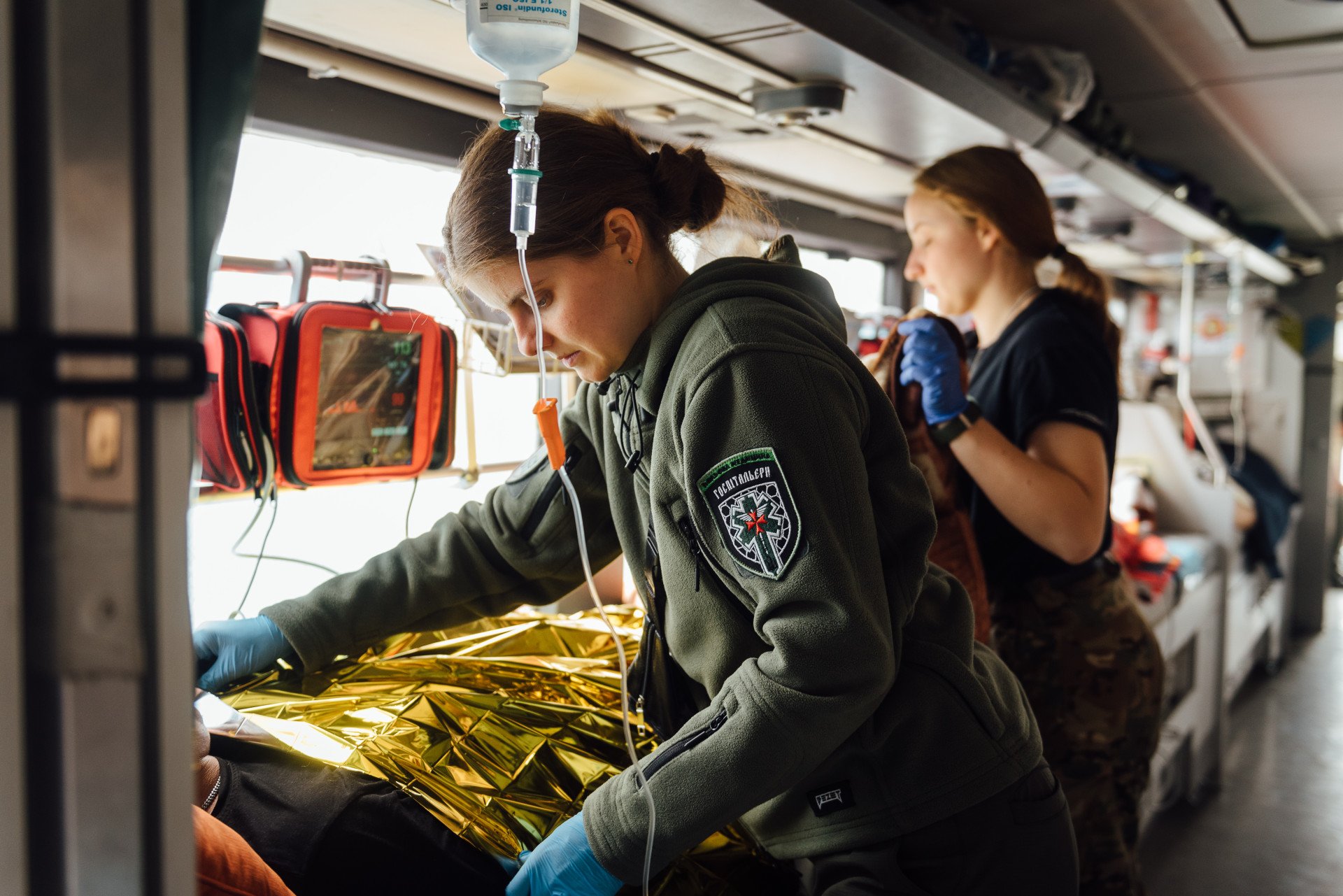
“For the sake of every life” is the motto of Hospitallers, Ukraine’s volunteer paramedic force. These dedicated combat medics operate on the frontlines, saving others amid relentless Russian assaults. Having evacuated over 19,000 wounded since the full-scale invasion, their stories embody courage, sacrifice, and unwavering commitment—for the sake of every life.
Hours after Russia’s full-scale invasion of Ukraine, thousands of Ukrainians and foreign allies self-organized volunteer groups to fight back. School gymnasiums and university lecture halls opened their doors to locals weaving camouflage nets, cafes and restaurants donated food and kitchen space to supplement army rations and provide food for civilians most impacted by the war, and animal rescue volunteers rushed to secure pet food and carriers for immediate evacuations. Some went even further—joining the Hospitallers Medical Battalion as combat medics.
Hospitallers was founded in 2014 by Yana Zinkevych in response to Russia’s initial invasion of Ukraine and occupation of Crimea and parts of Donetsk and Luhansk regions. Since then, they have trained 2226 medics and as of November 1st, the battalion consists of approximately 500 members, most of whom are under 30 years old, said Zinkevych.
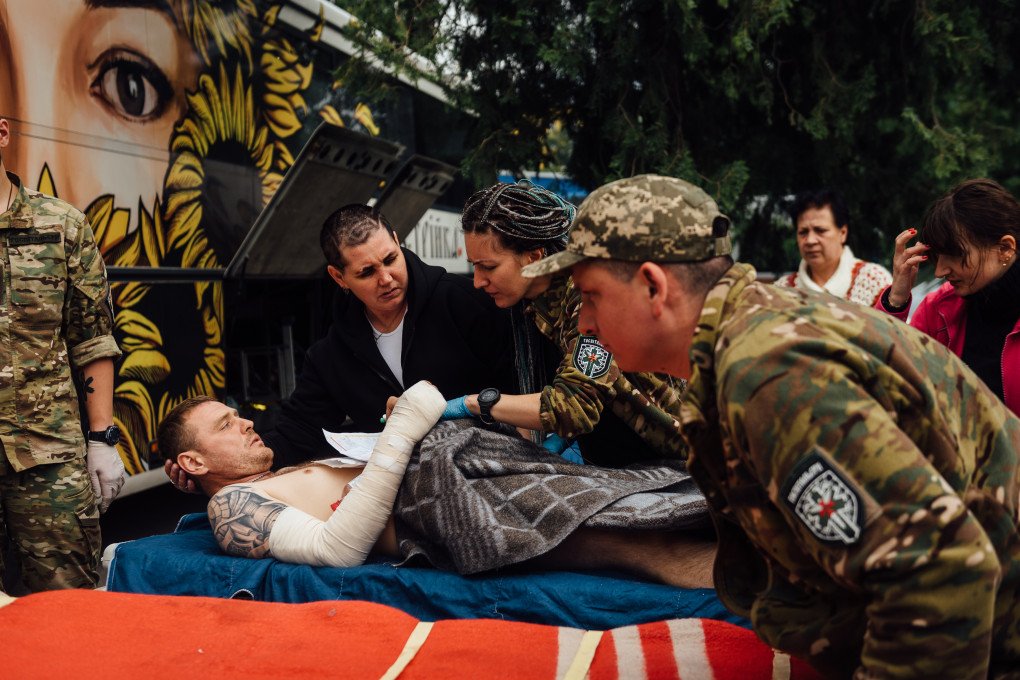
“They would have done the same for me”
One such medic is Taras, who goes by the callsign “Liutyi.” In the months leading up to the full-scale invasion, Liutyi was a medical student approaching graduation at Lviv National Medical University. He was also an experienced marksman and off-roader, which, he jokes in a tired but upbeat voice, taught him how to maneuver vehicles across swamps. Having lived in Europe and traveled across Scandinavia, Liutyi felt that his place was in Ukraine, among his people, and that it was his duty as a man to go to the defense of others—so, naturally, he applied to join the Hospitallers in April 2022.
It didn’t matter what role I filled there—what mattered was that I join the Hospitallers and provide aid.
Liutyi
Combat medic
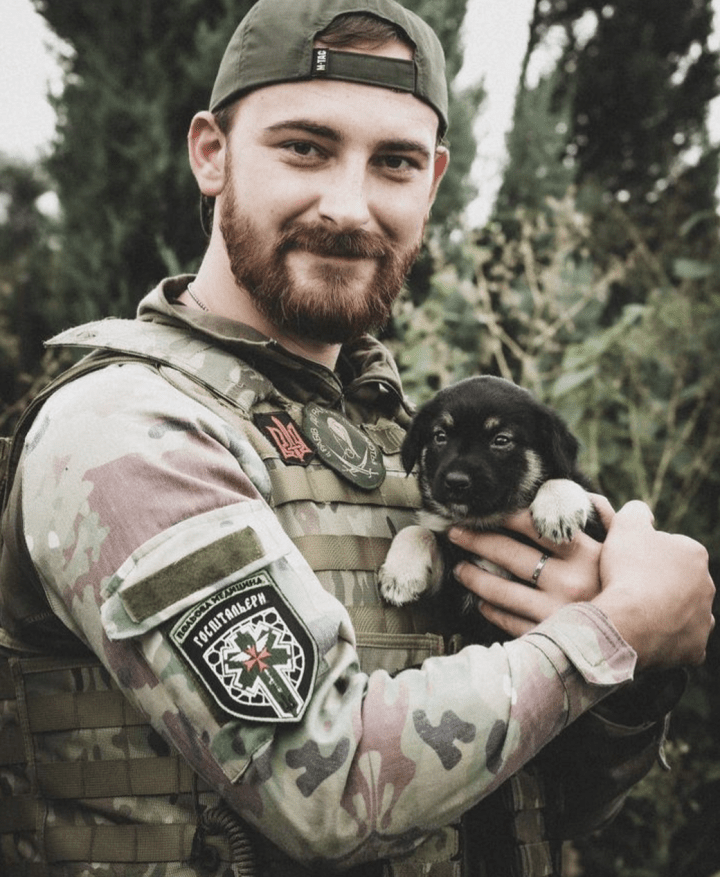
“Every evacuation leaves an impression,” says Liutyi. Two evacuations, however, stand out in particular for the medic.
Fear of death
The first was in May 2022, just months into Russia’s full-scale war. At the time, his crew was in Siverskodonetsk (formerly Severodonetsk), Luhansk region. A unit retreating from the Klishchiivka forest under heavy Russian fire was forced to leave behind two of their fallen men. One of the unit commanders approached Liutyi and shared that his vehicle had been destroyed in a fire attack, but he needed to get his men out—“If they kill me, then I’ll be with them. But I need to retrieve their bodies because their wives, mothers, and children are waiting for them.” Liutyi went with him.
It was a difficult mission, but they were able to retrieve the bodies on the second attempt. “When we got them out,” he recalls, “the unit commander told me that they would have done the same thing for him. He said, ‘I don’t want to be a missing person. I would want people to be able to come to my grave, grieve, and get some relief. There is honor in dying in battle.’” At that moment, Liutyi understood that fear of death doesn’t exist among such men.
Serhii with the banana
Other evacuations have more positive outcomes. Liutyi recalls one where he and the late combat medic Iryna Tsybukh, callsign “Cheka,” were serving with a special operations forces soldier, known only as Serhii. Before heading out to places where no other vehicles dared to enter, they grabbed three bananas, a banana each, to sustain themselves through the long hours of the night ahead.
“I handed him the banana and told him to hold onto it tightly—it’s yours now.” Later, when Serhii was lying naked on the operating table at a stabilization point, after stepping on an explosive and losing his foot, the only thing he called out was, “Don’t take my banana!” The banana, explained Liutyi, became a representation of his desire to hold onto life. Ultimately, Serhii was outfitted with a prosthetic and continues to serve to this day.
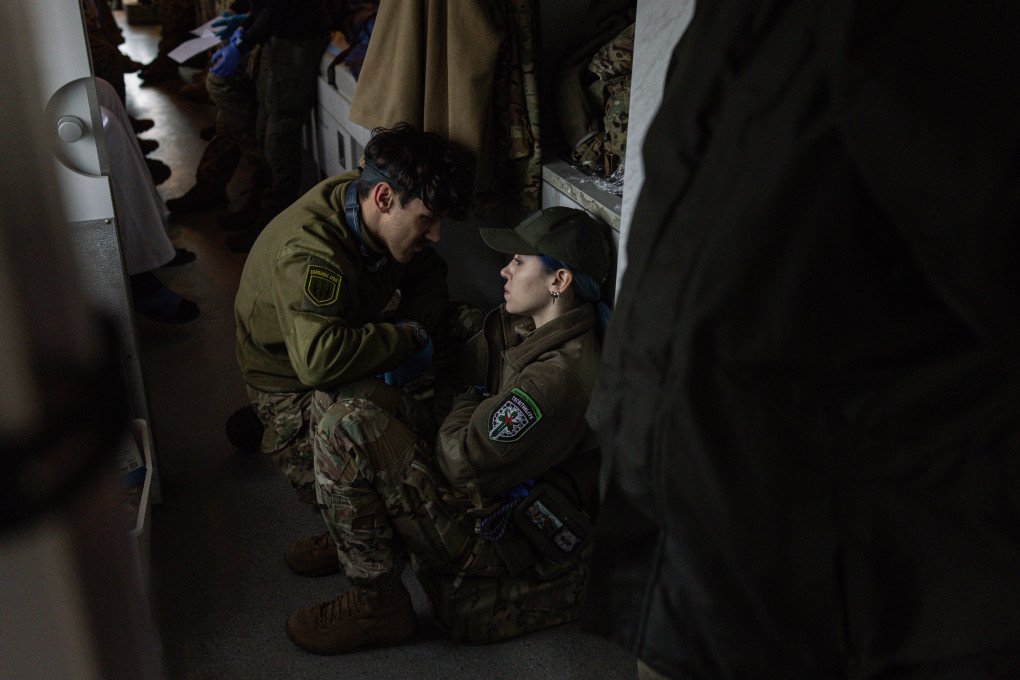
“Angels among us”
All different types of people join the Hospitallers. These are people who left behind their homes and their comfortable lives and joined as volunteers. Liutyi calls them angels who walk among us. “They set themselves on fire to keep others warm,” he says. The combat medics also share another universal quality—the belief in victory.
For Liutyi, victory would mean never living near a neighbor like Russia again. However, he can’t dream about what comes after victory yet, his eyes are set on the goal at hand right now. The medic is on his third consecutive 24/7 shift at a hospital, when he shares that he hopes to live to see victory but explains that there have been so many losses, he can count on one hand how many people close to him remain. “There’s no fear of death anymore,” he says in a calm, steady voice that comes with acceptance. “Physically, I still exist on this earth. But emotionally, half of me has already left for the afterlife.”
Still, he knows that his work here isn’t done, “We are going to have a country of veterans and we will need to work through these wounds our entire lives because we have veterans who are 20 years old and veterans who are 60 years old. It’s my obligation to them, to the people, to the country.”
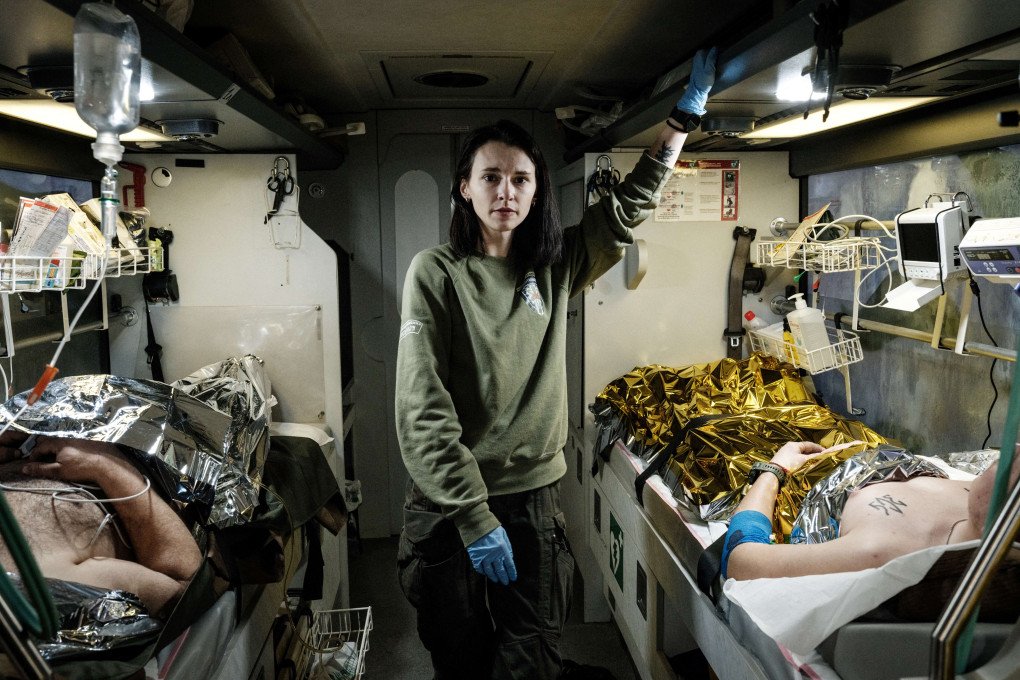
Giving up is not an option, says Liutyi, as the coming days and months will be decisive for the future of the country they’ve been fighting for.
His message is to not be afraid. Ukrainians understand perfectly well who they’re up against—a huge machine, one of the strongest armies in the world, with nearly unlimited material and physical resources. Ukraine, although a relatively small country in comparison, has been resisting for over 1000 days of Russia’s full-scale war and a decade of occupation in the east and south of the country. The main issue, he explains, is that Ukraine, the barrier between Russia and the rest of Europe, has not received the aid and security it was guaranteed following its 1994 nuclear weapons disarmament. Ukrainians can’t afford any fear-based delays, because every delay costs lives.
“Freedom is like a tree,” he says, “it needs water to survive. Right now, that water is our blood, and, unfortunately, we are becoming less and less.”
Iryna “Cheka” Tsybukh, who served in the same crew with Liutyi from August 2022 up until her death on May 29, 2024, is one of those who watered the tree of freedom with her blood.
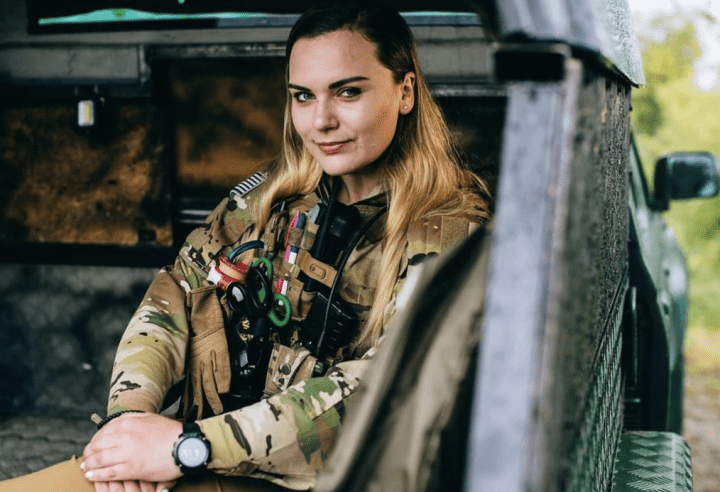
Cheka was a senior combat medic and activist who was killed just days before her 26th birthday while on rotation in the Kharkiv region. Thousands of people attended her memorial in Kyiv and thousands more were present at her funeral in Lviv, for a final farewell.
More recently, Mariia-Khrystyna “Alpaca” Dvoinyk, was also killed while on rotation. Zinkevych shared that Alpaca was fearless and never hesitated to put herself in harm’s way if it meant she could save her brothers and sisters-in-arms and bring them home alive.
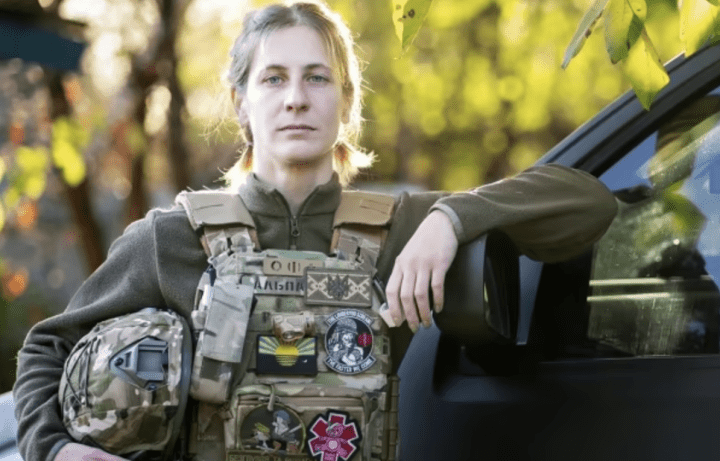
“There are many losses,” says Liutyi. “And every loss is painful.” Why would anyone voluntarily choose this path? “This is about honor and dignity,” he says. “I’m sincerely grateful that I have the opportunity to know such people and to be a drop in the ocean of saving lives.”
Hospitallers evacuated 19,323 wounded as of November 1, 2024; 16,123 of those evacuations have been since February 24th, 2022. An additional 7,500 wounded have been transported by a specially equipped medical bus "Avstriyka"—a “stabilization point on wheels” from frontline hospitals to the interior. The bus got its name in memory of a fallen Hospitaller medic Natalia Frauscher, call sign "Avstriyka" (Austrian in Ukrainian).
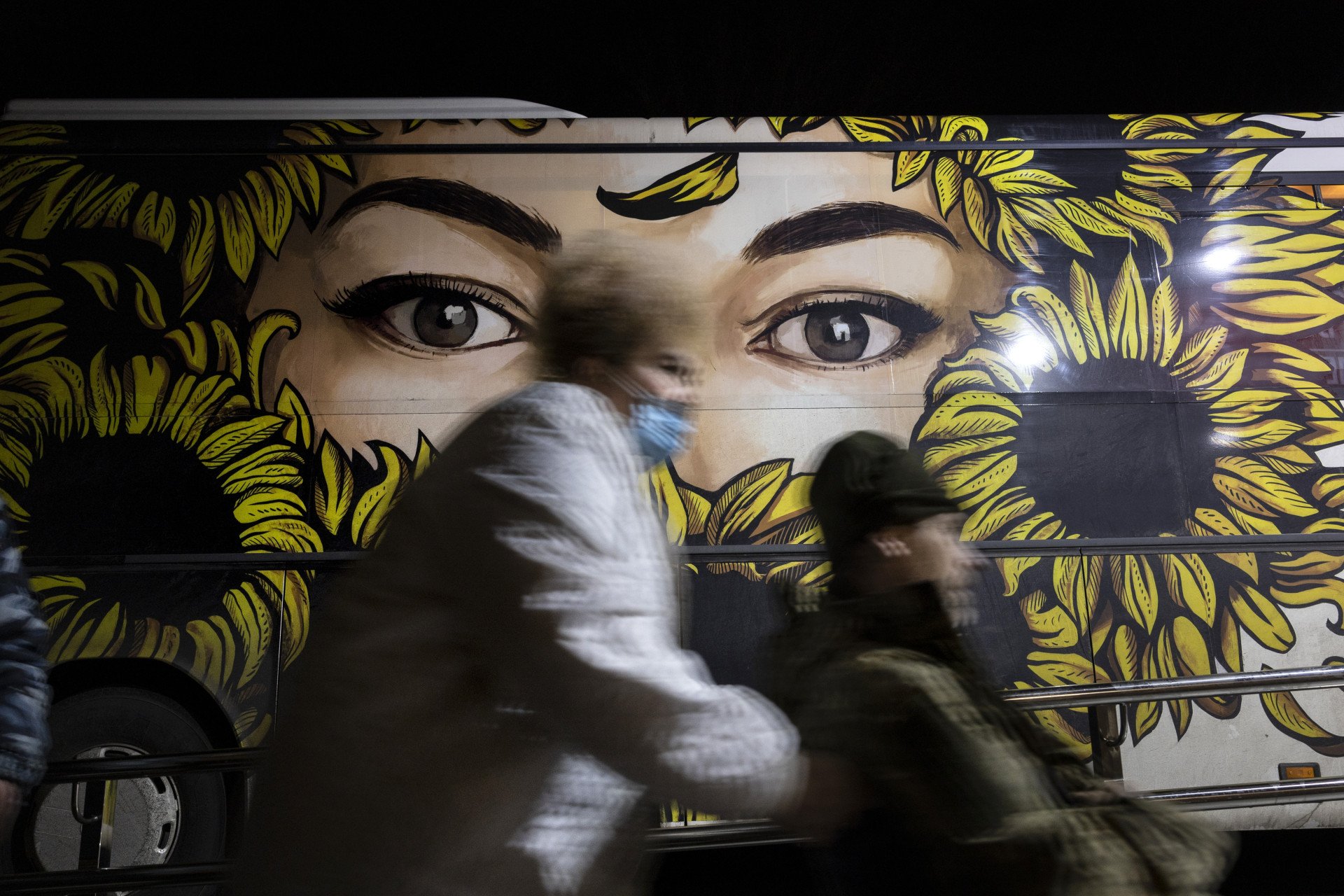
UNITED24 Media is raising funds to help Ukrainian medical workers. Donate now to provide ambulances, hospital supplies, and medical equipment to help save lives.
-8fda54010650befcec1e2c4d694c566b.jpg)
-35249c104385ca158fb62273fbd31476.jpg)


-554f0711f15a880af68b2550a739eee4.jpg)



-206008aed5f329e86c52788e3e423f23.jpg)